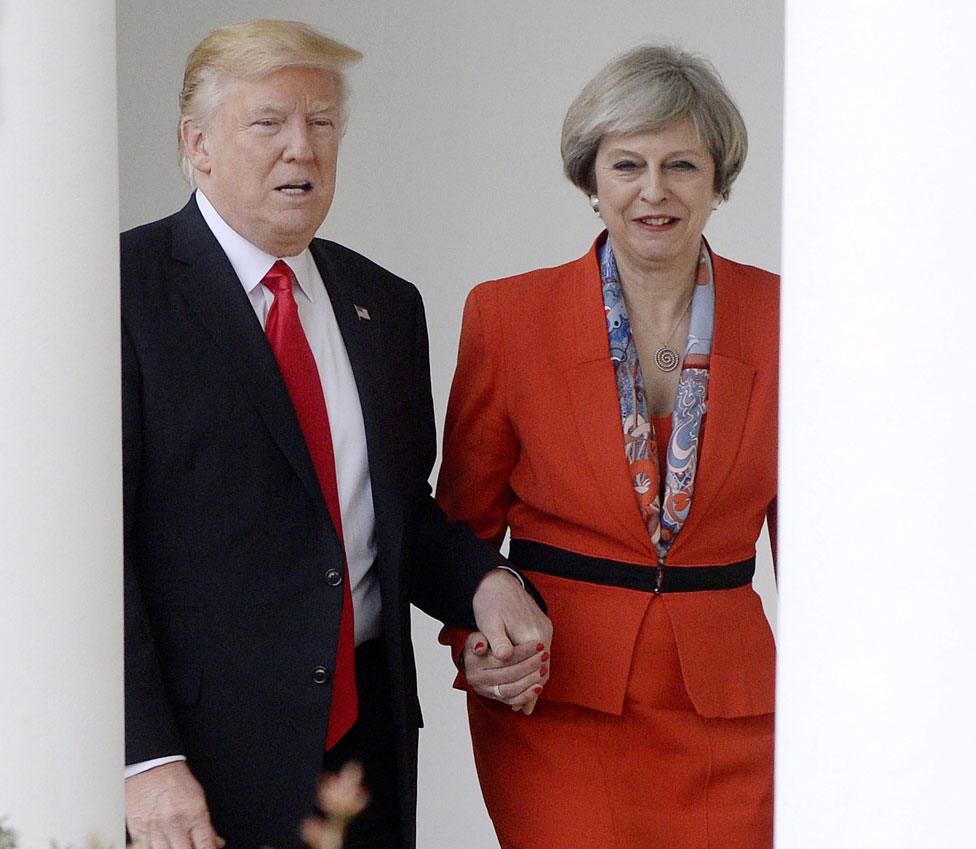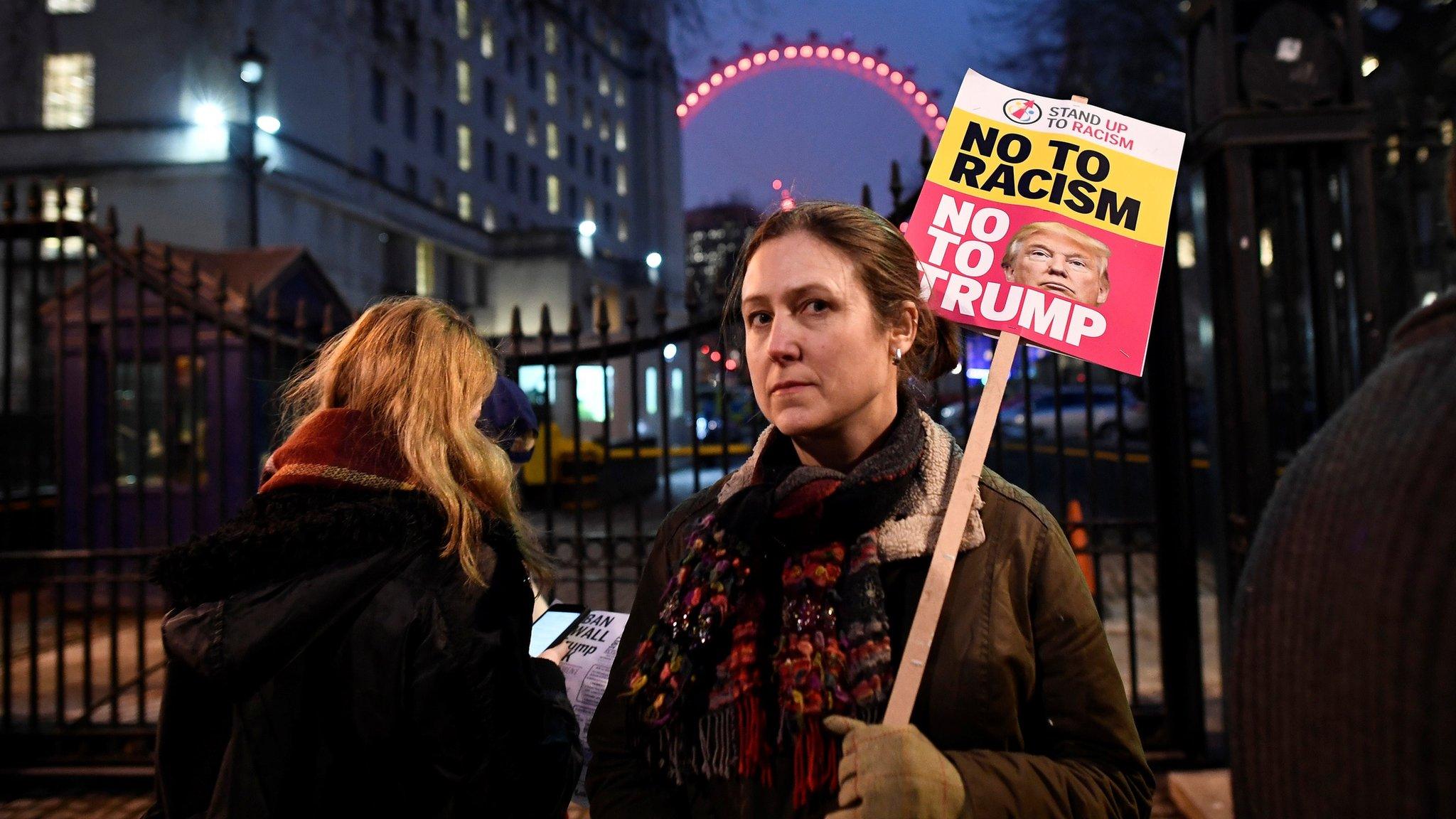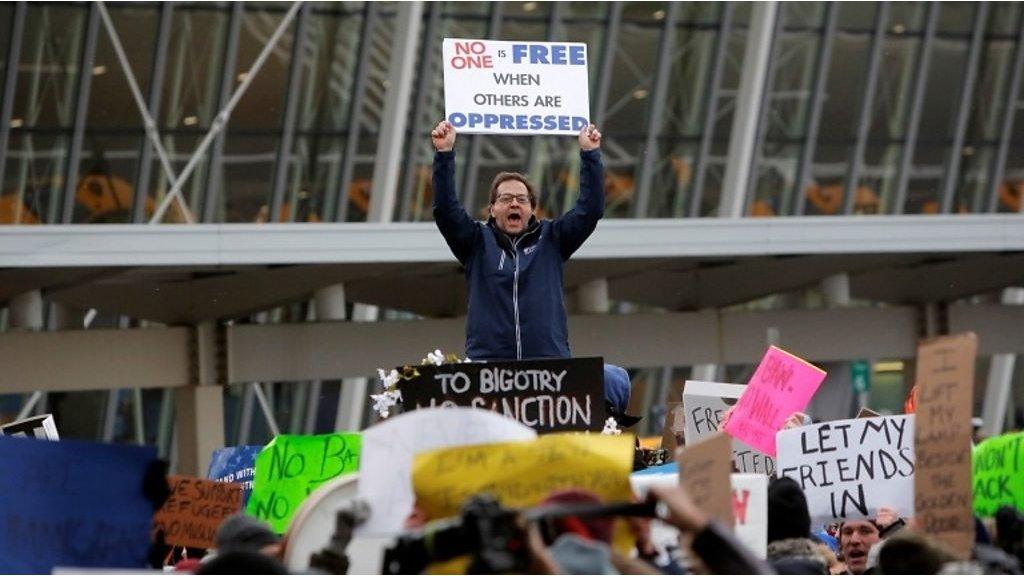Boris Johnson says Trump ban won't affect UK nationals
- Published
Boris Johnson: "Let me remind the House of the vital importance of this country's alliance with the United States"
Donald Trump's controversial immigration crackdown will make "no difference" to anyone with a British passport, Boris Johnson has told MPs.
The foreign secretary said he had been assured Britons born overseas or with dual passports would not be affected.
He also dismissed criticism of a planned UK state visit by Mr Trump.
Labour said the government had been slow to respond to Mr Trump's travel ban on refugees and citizens from nations including Syria, Iran and Iraq.
An executive order signed by Mr Trump on Friday halted the US refugee programme for 120 days, indefinitely banned all Syrian refugees and suspended the entry of all nationals from seven Muslim-majority countries, also including Yemen, Sudan, Somalia and Libya.
The White House says a ban is justified on grounds of national security.
It has also indicated that it might extend so-called "extreme vetting" procedures to more countries.
The shadow foreign secretary thought Boris Johnson's statement had "a few pages missing"
Mr Johnson said the UK government did not agree with the "highly controversial" policy.
His statement to MPs came after confusion over the effect of the ban on UK nationals, with the US embassy in London issuing a statement telling any citizens of the seven countries in question and also those holding dual nationality not to apply for a visa for the time being.
The foreign secretary said the UK government had been assured the measures would make "no difference to any British passport holder irrespective of their country of birth or whether they hold another passport", telling MPs the US embassy advice had been updated during his statement.
He underlined the "vital importance" of the UK's joint working with the United States in defence, intelligence and security.
Over a million people have signed a petition calling for Mr Trump's state visit to be stopped.
Mr Johnson said there was no reason why Mr Trump should not be given a state invitation to the UK "and every reason why he should".
Baroness Warsi tells Radio 4's Today President Trump's travel ban is a "ban on muslims"
He praised Prime Minister Theresa May's recent visit to the US, saying her relationship with Mr Trump had drawn "very apposite" comparisons with Margaret Thatcher's friendship with Ronald Reagan.
But Labour's shadow foreign secretary Emily Thornberry demanded to know whether the migration crackdown had been discussed on Mrs May's trip to Washington and said the UK needed a prime minister "who is prepared to tell him to stop, not one who simply proffers her hand and silently helps him along".
Mr Johnson said Labour's strategy was "pointlessly to demonise" Mr Trump.

Donald Trump and Theresa May held hands briefly as they walked during the PM's trip to the White House
Green Party MP Caroline Lucas accused the government of being "complicit with tyranny", but Conservative MP Jacob Rees-Mogg said the UK should "not seek to tell America how to run itself".
Mr Trump's move has been criticised by MPs from all parties, with former Conservative cabinet minister Baroness Warsi describing it as a "Muslim ban" in all but name.
She told the BBC that the UK government must be forthright in its response.
But former UKIP leader Nigel Farage said many British politicians were guilty of "double standards", suggesting he had not heard any condemnation of President Obama for imposing a six month ban on Iraqis entering the US in 2011 following the discovery of two suspected Iraqi terrorists living in Kentucky.
He added: "This was all part of his (Donald Trump's) manifesto, In fact, in some ways he has not gone as far as he said during some parts of the campaign."
Earlier, pressed on why the honour of a state visit had been extended to the president so soon after taking office, the PM's spokesman told journalists normal procedure had been followed after recommendations were made by a committee for state visits which works within the Foreign Office.
Downing Street later added that the PM had been "very happy" to ask the president to come to the UK and Mrs May said the invitation still "stands".
- Published30 January 2017

- Published30 January 2017
